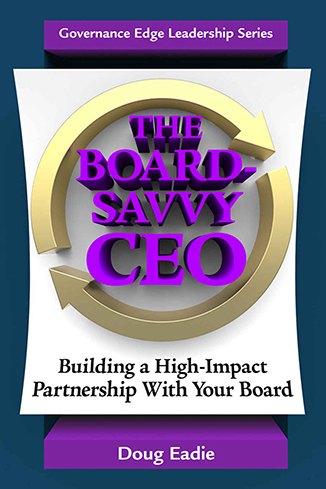This post is excerpted from an article that was published several months ago at www.dougeadie.com. This past weekend, listening to the podcast that Bob Eckardt, Executive Vice President of the Cleveland Foundation, recorded for the following article reminded me what an important resource community foundations are for nonprofit CEOs who aim to provide extraordinary leadership.
I was delighted when Bob Eckardt, Executive Vice President of the Cleveland Foundation, accepted my invitation to record the podcast that’s featured in this article. Bob is eminently qualified to discuss nonprofit board leadership and the board-CEO partnership. Not only is he an experienced nonprofit board member and a serious student of the rapidly evolving field of nonprofit governance, he’s also second-in-command at one of the nation’s preeminent community foundations. By the way, according to the Council on Foundations, community foundations are “grantmaking public charities that are dedicated to improving the lives of people in a defined local geographic area. They bring together the financial resources of individuals, families, and businesses to support effective nonprofits in their communities.” The more than 750 community foundations in every state in the Union made grants in their various communities totaling an estimated $4.3 billion in 2011.
With its $1.8 billion endowment, the Cleveland Foundation is, indeed, a heavy hitter in the field of local philanthropy, and its grants totaling around $80 million annually have played a major role in strengthening the nonprofit sector in the Cleveland metropolitan area. As Bob makes clear in his podcast, it makes good financial sense for nonprofits in Greater Cleveland to take governance seriously, since in reviewing grant applications, the Cleveland Foundation pays close attention to applicants’ governing capacity, in terms not only of board diversity and governing performance, but also the strength of the board-CEO partnership. I’m confident that many, if not most, community foundations around the country share the Cleveland Foundation’s commitment to effective nonprofit governance and seriously consider governing capacity when acting on grant proposals.
On a more personal note, looking back on the twenty-five very happy and professionally productive years I spent in Cleveland, I realize that the Cleveland Foundation played a critical role in the development of my career in the field of nonprofit leadership and management. I originally came to Cleveland after three years as a Peace Corps teacher in Ethiopia, to become a fellow in Case Western Reserve University’s Graduate Program in Public Management Science – an innovative educational experiment funded by the Cleveland Foundation, And I was recruited back to Cleveland to become one of three special assistants to the new, young, African-American president of Cleveland’s Cuyahoga Community College, whose salaries were paid by a handsome grant from the Cleveland Foundation. And a few years later, having founded my nonprofit consulting firm, I saw first-hand the tremendous investment the Cleveland Foundations was making in building the leadership capacity of nonprofit inner-city community development corporations, which could never have afforded high-quality technical assistance without Cleveland Foundation support. I doubt that my experience is at all unique, which means that community foundations all over the country have over the years promoted not just the effectiveness of nonprofit organizations in their communities, but also – less directly – the development of a talent bank of professionals like myself who help nonprofits carry out their critical missions.






